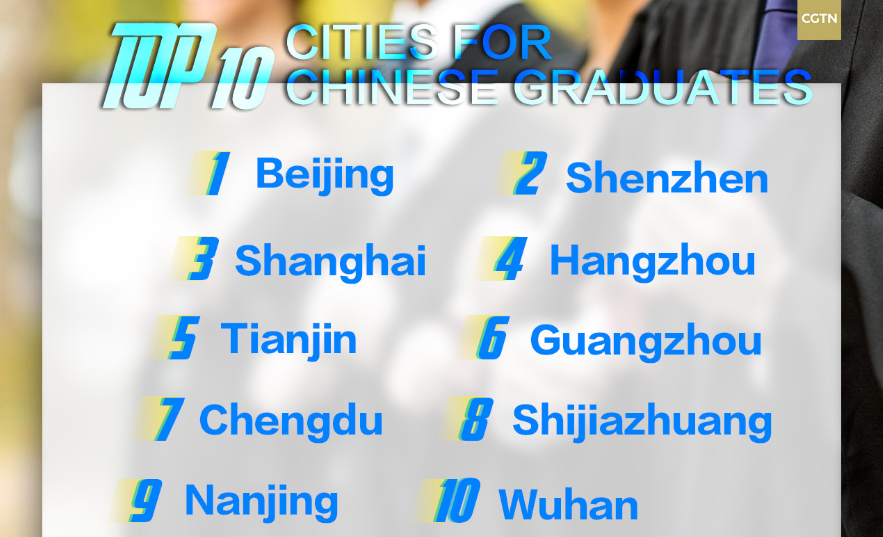
From the People's Daily app.
And this is Story in the Story.
The population of college graduates is projected to reach a record high this year, turning an already tough job market into a pressure cooker and intensifying the scramble for talent nationwide.
To many new graduates, mega cities such as Beijing, Shanghai and Guangzhou, Guangdong province, are less attractive because of their high cost of living and greater peer pressure in the job market. And so, the graduates are looking elsewhere.
The trend is changing the employment landscape in China, but it's good news for second and third-tier cities. The mega cities' loss could be their gain in the brain drain game.
A recent report by the Beijing Municipal Education Commission said that more than 231,000 college students graduated from universities in Beijing last year, but 37.5 percent of employed graduates chose to work outside the capital.
Today’s Story in the Story looks at how graduates are coping with the tough job market and where many end up going to get a job.

College graduates at a job fair in Henan University. (Photo: IC)
A female college student surnamed Zhang said that she chose to work in Wuhan, Hubei province, after graduating from Tsinghua University in June 2018.
"The biggest reason driving me away from Beijing was the living cost," she said. "Though I can earn 8,000 ($1,160) or even 10,000 yuan a month in Beijing, the rent may cost me 3,000 yuan or more each month, let alone other expenses such as meals, transportation and getting together with friends."
In contrast, some so-called new first-tier cities like Chengdu, Sichuan province; Hangzhou, Zhejiang province; and Wuhan have sprung up as new attractions to college graduates for their cheaper living costs and preferential policies to newcomers.
Data cited from Zhaopin, an online recruitment platform, shows that college students slated to graduate in 2019 have higher expectations of working in these cities, than in cities like Beijing, Shanghai and Guangzhou.
According to the platform, 44 percent of new graduates this year wish to find their jobs in new first-tier cities, while only about 30 percent hope to work in Beijing, Shanghai and Guangzhou.
Yang Zheng, who graduated with a master's degree from Fudan University in Shanghai in March, said that he received three offers from companies in the city, but finally chose a high-tech enterprise in neighboring Hangzhou.
"I've spent about seven years in Shanghai, it's time to explore a new world," he said. "The most important reason I chose Hangzhou is the city's potential development in the high-tech industry, which can bring us more opportunities."

(Photo: CGTN)
Also, these new first-tier cities have preferential policies for residence permits and financial incentives to lure more talent.
For example, Zhenjiang in Jiangsu province, promised bonuses of 150,000 and 200,000 yuan for house purchases to graduates with master's and doctoral degrees, respectively, after they work in the city for three years.
Haikou, capital of Hainan province, is attracting college students with a monthly rent subsidy of 1,500 yuan, with an 18,000 yuan allowance to graduates who decide to buy an apartment there.
The annual graduate employment report from the C9 League, an alliance of nine top universities in Chinese mainland, said that while Beijing's increasing cost of living is pushing a large number of young graduates to leave for other first-tier cities, the national capital has retained its position as the most attractive city for Chinese graduates.
The report by the C9 League, also known as the Chinese Ivy League, showed an incremental drop in the proportion of Peking University graduates opting to work in Beijing over the past three years, while figures from Tsinghua University showed a similar decline.
"On one hand, the high cost of living, conditions and traffic congestion factors are affecting university graduates' choices. On the other hand, it means other cities including first-tier cities such as Shanghai and Guangzhou, and even some new first-tier cities have more opportunities," said Li Qiang, a senior career consultant at Zhaopin.
Shanghai, on the contrary, is able to retain over half the graduates from Fudan University and Shanghai Jiao Tong University.
The report also ranked the financial sector as the most attractive industry for university graduates with 23.44 percent choosing to work in this field, which complements Shanghai's position as an international financial hub.
According to the ministry of education, the number of college graduates is projected to reach a record high of 8.3 million this year, up by 140,000 from 2018.
(Produced by Nancy Yan Xu, Brian Lowe, Lance Crayon, and Chelle Wenqian Zeng. Music by: bensound.com. Text from China Daily and CGTN)


